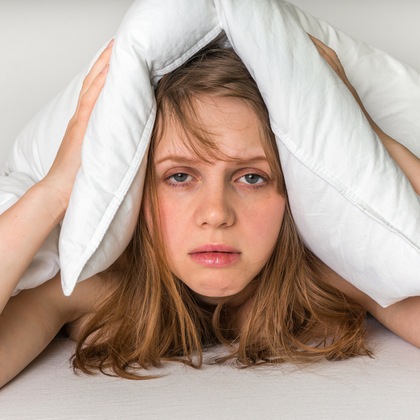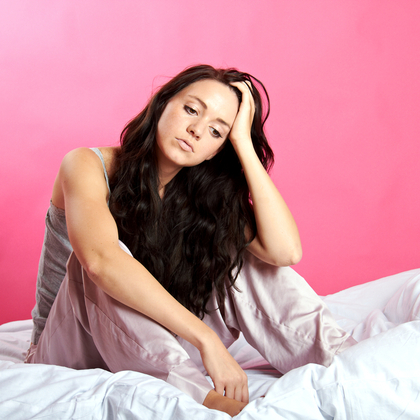Anyone who’s ever tossed and turned in bed for hours desperately trying to get to sleep knows how tired, irritable and below par it can make you feel the next day.
Without sufficient sleep, your body cannot recover from the physical and emotional stresses and strains of the day. So no wonder it makes you feel out of sorts. In fact, there’s plenty of evidence to suggest lack of sleep can lead to more serious concerns, including heart disease, premature ageing and road traffic accidents (i).
Generally speaking, we’re sleeping less these days. The Mental Health Foundation claims people sleep an estimated 90 minutes less every night than they did in the 1920s (i).
But many also battle with more specific sleep problems. According to the NHS, a third of people in the UK are thought to suffer from episodes of insomnia at some point in their life (ii).
Insomnia is defined as having difficulty falling asleep, waking up during the night, waking up early in the morning and finding it difficult to function the next day. It’s thought to be more common in women than in men, and you’re more likely to be affected by it as you get older.
How much sleep do you need?
It’s generally accepted that most people need between seven and nine hours of sleep a night (ii). But one person’s sleep requirements vary compared with the next, and there are those who function perfectly well on six hours a night, whereas others crave nine or even 10.
However, getting too much sleep isn’t always a good thing. Indeed chronic oversleeping has been linked with several health problems, including heart disease, diabetes, depression, obesity, back pain and headaches (iv).
It’s also a myth that you need less sleep as you get older. This misconception may arise from the fact that many older people tend to sleep more lightly and wake more frequently during the night. In fact, according to the American Academy of Sleep Medicine, adults need the same amount of sleep throughout their lives, whatever their age (only children and teenagers need more sleep than adults) (v).
What causes poor sleep?
There are many things that may prevent you from sleeping at night – though sometimes there’s no apparent reason whatsoever. However, the main culprits include the following:
Stress
Worrying about work, relationships, money and health can keep your mind active at night. And when you find it difficult to switch off, it can be almost impossible to get to sleep. On the other hand, you may be able to fall asleep without much of a problem, but you could wake during the night and start having worrying thoughts. Even becoming stressed out about not being able to sleep can keep you awake. Find out more about stress.
Depression
Sleep problems can be a symptom of depression, as well as other mental health conditions such as bipolar disorder, and anxiety disorders including post-traumatic stress disorders, generalised anxiety and panic disorder. Read more about the signs and symptoms of depression.
Medical conditions
There are lots of reasons your health may be keeping you awake at night. Insomnia can be caused by conditions that cause chronic pain, such as arthritis and other joint or muscle problems, or conditions that cause breathing difficulties, such as asthma and chronic obstructive pulmonary disease (COPD).
According to the NHS, insomnia can also be caused by underlying health conditions such as heart disease, neurological disease (Parkinson’s or Alzheimer’s disease, for instance), hormonal problems (such as overactive thyroid), urinary incontinence, prostate problems and sleep disorders including sleep apnoea and restless legs syndrome (ii). Menopause-related hot flushes can also disrupt and cause poor sleep.
Caffeine and other stimulants
Drinking too much coffee, tea or other foods or drinks containing caffeine during the day can cause sleeplessness at night.
But caffeine isn’t the only widely used stimulant that affects sleep. Drinking alcohol may help you fall sleep, but it can affect your sleeping patterns, so you may wake up during the night or early in the morning, and generally sleep less soundly. Nicotine is another stimulant that you should avoid for your health in general, and also if you want to get a good night’s sleep.
Over-the-counter and prescription medicines
Another reason for sleep problems could be medications you may be taking, even in the short term, as many over-the-counter (OTC) medicines — including some pain medication combinations, decongestants and weight-loss products — contain caffeine and other stimulants.
Prescription medicines such as some antidepressants, high blood pressure medicines called beta-blockers, some asthma medicines, drugs used to treat conditions such as attention deficit hyperactivity disorder (ADHDH) and hormone replacement therapy (HRT) may also cause sleep problems.
Should you see your GP?
If you’ve been having sleep problems for longer than three weeks, if you have insomnia for no known reason or if you have symptoms that suggest you may be suffering from anxiety or depression, it’s a good idea to see your doctor.
If necessary, your GP can prescribe much stronger sleeping medications such as hypnotics or benzodiazepines. These medicines, however, should only ever be used in the short term.
Sleep well tips
If you’re not sleeping as well as you should, the good news is there are lots of things you can try to help you wake up feeling more refreshed:
Get into a sleep routine
Get into the habit of having a regular evening ritual so your body starts recognising that it’s time for bed. You could, for instance, take a bath or shower and listen to some soothing music or a relaxation CD before turning in. Keep to the same routine every night, whenever possible.
Avoid caffeine
Find out at what point you have to stop drinking caffeine during the day to get a good night’s sleep. Some people may only be able to have one caffeinated cup of tea or coffee in the morning, while others may be able to drink caffeine until the early evening. Just discover what works for you, and avoid caffeine after your deadline (also remember, your deadline may change as you get older). Chocolate contains caffeine too, so avoid eating it or drinking hot chocolate or cocoa too.
Warm some milk
If you’re missing having a cup of cocoa before going to bed, try swapping it for a cup of plain, warm milk. This may help you sleep as it contains a chemical called tryptophan, which is converted into a sleep hormone (serotonin) in your brain.
Eat early
Avoid having a big meal too late in the evening, as an overactive digestive increases your metabolism and body temperature, both of which can disrupt your sleep or make it difficult for you to nod off. Try to allow at least two to three hours for your body to digest your food before going to bed.
Create a bedtime sanctuary
If you want to sleep well, your bedroom shouldn’t be a place for watching TV, reading or eating. Instead, it should be a haven of peace, with no noise, light or other stimulation. Try to keep the temperature in your bedroom cool when you’re sleeping – don’t let it get too cold (or too hot) during the winter months, and open a window during the summer to keep it cool. Indeed, according to the Sleep Council, the ideal temperature in a bedroom for sleep is 16 - 18C/60 - 65F (vi). Your bedroom should also be as dark as possible. So leave all those glowing electronic devices in another room, and consider investing in blackout curtains or blinds if your room still isn’t dark enough. You may also want to replace an old bed or mattress if you find it difficult to get comfortable when you’re trying to fall asleep (according to The Sleep Council, sleeping on an uncomfortable bed could rob you of up to an hour’s sleep (vii)).
Calm your sense of smell
Aromatherapy oils have a long tradition of helping people to sleep, with many swearing by a few drops of lavender oil on their pillow. You could also try a relaxing blend of oils in your bath water to help yourself unwind before going to bed.
Don’t just lie there
If you’ve been finding it difficult to fall asleep for a while, try getting out of bed and doing something that makes you feel relaxed. Staying in bed and becoming anxious about not being able to sleep never helps, and it could create associations in your mind between not being able to sleep and being in bed.
Be more active
Being physically active during the daytime could help you sleep at night. For instance, one study found people who get at least 150 minutes of exercise a week sleep significantly better and feel more alert during the day compared with others who exercised less (viii). However, avoid being too active near bedtime, as it can make it more difficult for you to wind down.
Snoring and sleep apnoea
If you’re finding it difficult to get enough sleep because you snore or your partner snores, you’re not alone. According to the British Snoring and Sleep Apnoea Association, 41.5 percent of adults in the UK snore – which is the equivalent of around 15 million people (ix). You’re also more likely to snore if you’re a man or if you’re between the ages of 50 and 59, though younger people aren’t immune as even children can snore too.
That familiar snorting and rattling noise is created by turbulence in your airways while you inhale, which makes the soft palate and other tissues in your mouth, nose and throat vibrate. This can be caused by a partial blockage anywhere from the tip of your nose to your vocal chords.
Reasons for snoring
There are several reasons why you may have a partial blockage, including having fat deposits around your neck, an obstruction at the back of your tongue, small or collapsing nostrils, a deviated septum, nasal polyps or nasal congestion and catarrh.
Whatever the cause, it’s no joke, as snoring can affect your quality of sleep, making you feel tired and unable to concentrate during the day. It can also put a huge strain on relationships, and has been cited as a common cause of divorce alongside financial problems and adultery
To stop snoring, try to lose weight if you need to, and if you smoke, make an effort to give up. That’s because cigarette smoke irritates your throat and nasal cavity, causing swelling and catarrh, which can make breathing through your nose difficult. Also avoid drinking before bedtime, as alcohol makes your muscles relax more than normal, which can lead to snoring.
Obstructive sleep apnoea
More serious than snoring is a related condition called obstructive sleep apnoea (OSA). This happens when your upper airways collapse while you’re asleep, resulting in irregular breathing at night and excessive sleepiness during the day.
According to Patient, an estimated four percent of middle-aged men and two percent of middle-aged women have OSA (x), and many cases may go undiagnosed because some people may not realise they have it.
The main risk factor for OSA is obesity, though others include having a large neck, smoking, drinking alcohol before bedtime and taking sedative drugs. If untreated, it can significantly affect your day-to-day life, and even increase your risk of having high blood pressure, a stroke, heart attack or atrial fibrillation (irregular heartbeat). So if you think you may be affected, see your GP, as there are several treatments available for OSA, such as continuous positive airway pressure (CPAP) devices that you wear while you sleep.
Remedies for restful sleep
If you have the odd occasion when you find it difficult to nod off when your normal routine is disrupted, for instance – there are over-the-counter sleep remedies that you can use in the short term. These contain the sedating antihistamines diphenydamine or promethazine. However, if you have glaucoma or prostate enlargement, you should avoid using these medicines, as they can lead to increased intraocular pressure and urinary retention.
Natural remedies that may help you get a better night’s sleep include the following active ingredients:
Valerian
The root of the herb Valeriana Officinalis, has been used as a treatment for insomnia since the second century AD. Today, it is often recommended as a treatment for occasional sleeplessness and also as a treatment for mild anxiety. Study results on the effectiveness of valerian for insomnia are mixed, but one review of 16 studies concludes that valerian might improve sleep quality without producing side effects (xi).
Magnesium
This mineral may be found in a range of foods, including whole grains, nuts and green leafy vegetables, but some nutritional experts believe many people suffer from low levels for a variety of reasons, and that taking a supplement may help improve sleep quality. Restless leg syndrome – one of the health conditions that’s thought to cause insomnia – may also be a sign of magnesium deficiency, with one study suggesting that magnesium treatment may help people with mild or moderate restless legs syndrome-related insomnia (xii).
5-HTP
A substance called 5-Hydroxytryptophan (5-HTP) may also be useful as it’s thought to help increase the production of serotonin – a sleep-inducing hormone – in the brain. According to researchers, taking 5-HTP supplements may effectively treat a range of conditions, including insomnia (xiii).
L-Theanine
One of the reasons most people find a cup of tea relaxes them more than a cup of coffee – despite the fact that both beverages contain caffeine – is that tea also contains a substance called L-theanine. This non-protein amino acid is found almost exclusively in green, black, oolong and pekoe tea, and is thought to stimulate the production of calming alpha brain waves. And while it will not make you feel drowsy, taking a theanine supplement could help make you feel more relaxed, including before bedtime.
Snoring remedies
If snoring is stopping you – or your partner – from getting a decent night’s sleep, there are various treatments you can try to reduce it, such as nasal strips, sprays and dilators, chin strips and gum shields called vestibular shields and mandibular advancement devices.
Nasal decongestants and strips may help you breathe more easily while gum shield devices may help to keep your airway open by keeping your lower jaw or your tongue forward while you’re asleep. Chin strips, on the other hand, help keep your mouth closed when you’re in bed, while mouth and throat sprays can help temporarily tighten the tissue of the soft palate and stop it vibrating.
Meanwhile, if snoring is affecting your quality of life, if you snore loudly and are tired during the day, or if you stop breathing, gasp or choke during sleep, see your GP.
Bad sleep and insomnia can be disruptive to your everyday life, but with some of the steps set out above, you could be getting a better night’s sleep in no time. You can find out more about other common health conditions by visiting our health library.
References:
-
Available online: https://www.mentalhealth.org.uk/a-to-z/s/sleep
-
Available online: https://www.nhs.uk/conditions/insomnia/
-
Available online: https://patient.info/doctor/insomnia
-
Available online: https://www.webmd.com/sleep-disorders/physical-side-effects-oversleeping#1
-
Available online: http://sleepeducation.org/news/2013/08/07/sleep-and-growing-older
-
Available online: https://sleepcouncil.org.uk/perfect-sleep-environment/
-
Available online: https://sleepcouncil.org.uk/bed-mot/
-
Loprinzi. PD, Cardinal. BJ. Association between objectively-measured physical activity and sleep, NHANES 2005-2006. Mental Health and Physical Activity. Volume 4, issue 2, 65-69.
-
Available online: https://britishsnoring.co.uk/media.php\
-
Available online: https://patient.info/doctor/obstructive-sleep-apnoea-syndrome-pro
-
Bent S. et al., Valerian for sleep: a systematic review and meta-analysis. Am J Med. 2006 Dec;119(12):1005-12. Available online: https://www.ncbi.nlm.nih.gov/pubmed/17145239
-
Homyak M. et al., Magnesium therapy for periodic leg movements-related insomnia and restless legs syndrome: an open pilot study. Sleep. 1998 Aug 1;21(5):501-5. Available online: https://www.ncbi.nlm.nih.gov/pubmed/9703590
-
Birsall. TC. 5-Hydroxytryptophan: a clinically-effective serotonin precursor. Altern Med Rev 1998 Aug:3(4):271-80.
-
Turkozu. D., Sanlier N., L-theanine, unique amino acid of tea, and its metabolism, health effects, and safety. Crit Rev Food Sci Nutr. 2017 May 24;57(8):1681-1687. Available online: https://www.ncbi.nlm.nih.gov/pubmed/26192072
Related Posts
Disclaimer: The information presented by Nature's Best is for informational purposes only. It is based on scientific studies (human, animal, or in vitro), clinical experience, or traditional usage as cited in each article. The results reported may not necessarily occur in all individuals. Self-treatment is not recommended for life-threatening conditions that require medical treatment under a doctor's care. For many of the conditions discussed, treatment with prescription or over the counter medication is also available. Consult your doctor, practitioner, and/or pharmacist for any health problem and before using any supplements or before making any changes in prescribed medications.

Christine
Christine Morgan has been a freelance health and wellbeing journalist for almost 20 years, having written for numerous publications including the Daily Mirror, S Magazine, Top Sante, Healthy, Woman & Home, Zest, Allergy, Healthy Times and Pregnancy & Birth; she has also edited several titles such as Women’ Health, Shine’s Real Health & Beauty and All About Health.
View More



